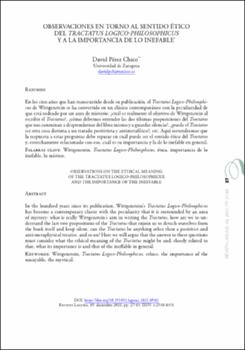Observaciones en torno al sentido ético del Tractatus Logico-Philosophicus y a la importancia de lo inefable
Autor
Pérez Chico, DavidFecha
2021Resumen
En los cien años que han transcurrido desde su publicación, el Tractatus Logico-Philosophi-
cus de Wittgenstein se ha convertido en un clásico contemporáneo con la peculiaridad de
que está rodeado por un aura de misterio: ¿cuál es realmente el objetivo de Wittgenstein al
escribir el Tractatus?, ¿cómo debemos entender las dos últimas proposiciones del Tractatus
que nos conminan a desprendernos del libro mismo y a guardar silencio?, ¿puede el Tractatus
ser otra cosa distinta a un tratado positivista y antimetafísico?, etc. Aquí sostendremos que
la respuesta a estas preguntas debe reparar en cuál puede ser el sentido ético del Tractatus
y, estrechamente relacionado con eso, cuál es su importancia y la de lo inefable en general. In the hundred years since its publication, Wittgenstein’s Tractatus Logico-Philosophicus
has become a contemporary classic with the peculiarity that it is surrounded by an aura
of mystery: what is really Wittgenstein’s aim in writing the Tractatus, how are we to un-
derstand the last two propositions of the Tractatus that enjoin us to detach ourselves from
the book itself and keep silent, can the Tractatus be anything other than a positivist and
anti-metaphysical treatise, and so on? Here we will argue that the answer to these questions
must consider what the ethical meaning of the Tractatus might be and, closely related to
that, what its importance is and that of the ineffable in general.





